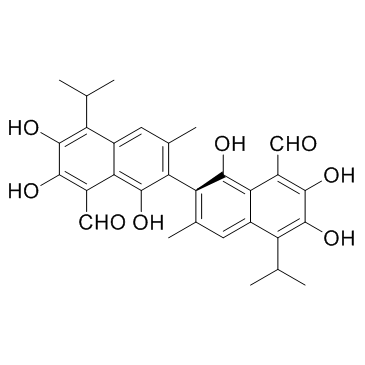
AT101
CAS No. 90141-22-3
AT101( —— )
Catalog No. M16483 CAS No. 90141-22-3
AT-101 is the levorotatory isomer of a natural product Gossypol.
Purity : >98% (HPLC)
 COA
COA
 Datasheet
Datasheet
 HNMR
HNMR
 HPLC
HPLC
 MSDS
MSDS
 Handing Instructions
Handing Instructions
| Size | Price / USD | Stock | Quantity |
| 100MG | Get Quote | Get Quote |


|
| 200MG | Get Quote | Get Quote |


|
| 500MG | Get Quote | Get Quote |


|
| 1G | Get Quote | Get Quote |


|
Biological Information
-
Product NameAT101
-
NoteResearch use only, not for human use.
-
Brief DescriptionAT-101 is the levorotatory isomer of a natural product Gossypol.
-
DescriptionAT-101 is the levorotatory isomer of a natural product Gossypol. AT-101 is determined to bind to Bcl-2, Mcl-1 and Bcl-xL proteins with Kis of 260±30 nM, 170±10 nM, and 480±40 nM, respectively.
-
In VitroThe natural racemic Gossypol has two enantiomers, namely the (R)-(-)-Gossypol (AT-101)and (+)-Gossypol enantiomers. (R)-(-)-Gossypol (AT-101) and (+)-Gossypol binds to Bcl-2 or Bcl-xL with similar binding affinities, AT-101 is more potent than (+)-Gossypol in inhibition of cell growth and induction of apoptosis, possibly due to the influence of serum in the cell culture experiments. The racemic form and each of the enantiomers of Gossypol are tested against UM-SCC-6 and UM-SCC-14A in 6-day MTT assays. AT-101 exhibits greater growth inhibition relative to (±)-Gossypol than (+)-Gossypol in both cell lines tested (P<0.001). An intermediate growth inhibitory effect is observed with (±)-Gossypol but this effect is only observed at the higher dose of Gossypol (10 μM, P<0.0001). (R)-(-)-Gossypol (AT-101) binds to the BH3-binding groove of Bcl-xL and Bcl-2 proteins with fairly high affinity, has potent activity against head and neck squamous cell carcinomas (HNSCC) cell lines in vitro. Furthermore, it induces apoptosis with high efficiency in HNSCC tumor cells that express functional p53 and that also kills tumor cells with mutant p53 by a different mechanism. AT-101 doses required to inhibit the growth of human fibroblast cell lines by 50% were 2- to 10-fold higher than for HNSCC cell lines. To inhibit human oral keratinocyte growth by 50%, (R)-(-)-Gossypol (AT-101) concentrations are 2-to 3-fold higher than for HNSCC cell lines. (R)-(-)-Gossypol (AT-101) causes dose-dependent inhibition of cell growth in ten UM-SCC cell lines over a range from 0.5 to 10 μM in a 6-day MTT assay. The relative sensitivity of the cell lines vary from a very sensitive group with an IC50 of 2-5 μM and a less sensitive group with IC50 clusters around 10 μM. (R)-(-)-Gossypol (AT-101) is determined to bind to Bcl-2, Mcl-1 and Bcl-xL proteins with Ki values of 260±30 nM, 170±10 nM, and 480±40 nM, respectively.
-
In Vivo——
-
Synonyms——
-
PathwayAngiogenesis
-
TargetBcl-2
-
RecptorMcl-1|Bcl-2|Bcl-xL
-
Research AreaCancer
-
Indication——
Chemical Information
-
CAS Number90141-22-3
-
Formula Weight518.55
-
Molecular FormulaC??H??O?
-
Purity>98% (HPLC)
-
SolubilityN/A
-
SMILESOC1=C2C(C=O)=C(O)C(O)=C(C(C)C)C2=CC(C)=[C@]1[C@]3=C(C)C=C4C(C(C)C)=C(O)C(O)=C(C=O)C4=C3O.[R]
-
Chemical Name——
Shipping & Storage Information
-
Storage(-20℃)
-
ShippingWith Ice Pack
-
Stability≥ 2 years
Reference
1. Oliver CL, et al. In vitro effects of the BH3 mimetic, (-)-Gossypol, on head and neck squamous cell carcinoma cells. Clin Cancer Res. 2004 Nov 15;10(22):7757-63.
2. Sun Y, et al. Apogossypolone, a nonpeptidic small molecule inhibitor targeting Bcl-2 family proteins, effectively inhibits growth of diffuse large cell lymphoma cells in vitro and in vivo. Cancer Biol Ther. 2008 Sep;7(9):1418-26.
molnova catalog



related products
-
trans-Ferulic acid
Trans-Ferulic acid causes the phosphorylation of β-catenin resulting in proteasomal degradation of β-catenin and increases the expression of pro-apoptotic factor Bax and decreases the expression of pro-survival factor survivin.trans-Ferulic acid exert both anti-proliferation and anti-migration effects in the human lung cancer cell line H1299.
-
Bax activator compou...
A specific, small molecule Bax agonist that promotes Bax-dependent but not Bak-dependent apoptosis.
-
Pyridoclax
Pyridoclax (MR29072) is a highly potent Mcl-1 inhibitor with Kd of 25 nM, disrupts Mcl-1/Bim interaction.



 Cart
Cart
 sales@molnova.com
sales@molnova.com


